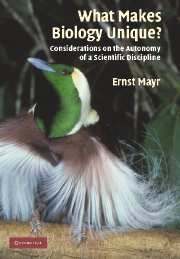Book contents
- Frontmatter
- Contents
- Preface
- Acknowledgments
- Introduction
- 1 Science and sciences
- 2 The autonomy of biology
- 3 Teleology
- 4 Analysis or reductionism?
- 5 Darwin's influence on modern thought
- 6 Darwin's five theories of evolution
- 7 Maturation of Darwinism
- 8 Selection
- 9 Do Thomas Kuhn's scientific revolutions take place?
- 10 Another look at the species problem
- 11 The origin of humans
- 12 Are we alone in this vast universe?
- Glossary
- Index
- References
7 - Maturation of Darwinism
Published online by Cambridge University Press: 10 December 2009
- Frontmatter
- Contents
- Preface
- Acknowledgments
- Introduction
- 1 Science and sciences
- 2 The autonomy of biology
- 3 Teleology
- 4 Analysis or reductionism?
- 5 Darwin's influence on modern thought
- 6 Darwin's five theories of evolution
- 7 Maturation of Darwinism
- 8 Selection
- 9 Do Thomas Kuhn's scientific revolutions take place?
- 10 Another look at the species problem
- 11 The origin of humans
- 12 Are we alone in this vast universe?
- Glossary
- Index
- References
Summary
Even though darwin had presented in 1859 the basic principles of Darwinism in great detail in Origin of Species, it took another eighty years for biologists to fully accept Darwinism. There were many reasons why there was so much disharmony in evolutionary biology during this long period. Perhaps the main reason was that the very concept of Darwinism continued to change over time. And different Darwinians endorsed different combinations of Darwin's five theories (see chapter 6). In my One Long Argument (1991), I describe nine different usages of the term Darwinism, more or less popular at different periods. Only a chronological treatment can do justice to the history of the concept of Darwinism.
Stages in the maturation of Darwinism
It is now obvious why there was such disharmony in evolutionary biology for the first eighty years. At the beginning, Darwinism simply meant anticreationism. An evolutionist was labeled a Darwinian as long as he adopted at least the theory that evolutionary change was due to natural causes and not to divine action (Mayr 1991, 1997). You were a Darwinian if you considered science a secular endeavor. Accordingly, opponents of natural selection such as T. H. Huxley and Charles Lyell were called Darwinians. No wonder the term Darwinism had so many meanings in the nineteenth century.
1859–1882
The first years after 1859 were a period of considerable confusion in evolutionary biology. To be sure, two of Darwin's five theories, an evolving world and common descent, were at once almost universally accepted.
- Type
- Chapter
- Information
- What Makes Biology Unique?Considerations on the Autonomy of a Scientific Discipline, pp. 117 - 132Publisher: Cambridge University PressPrint publication year: 2004



